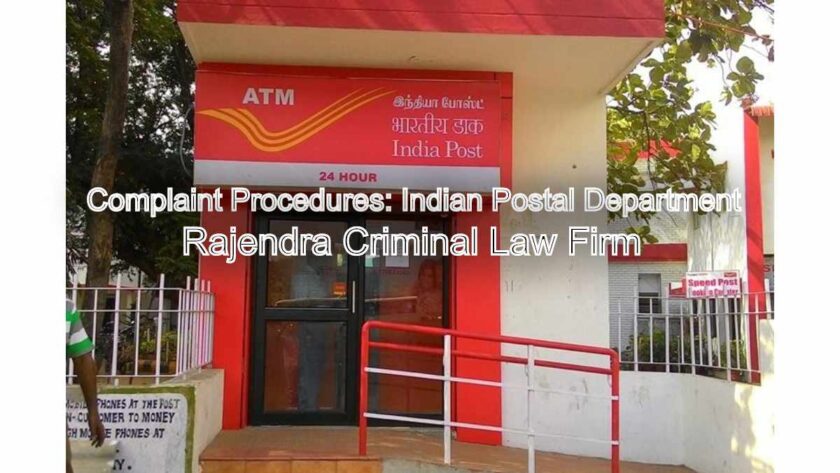Complaint Procedures for Officers: The Indian Postal Department, a vital lifeline connecting the nation, operates with a vast network of officers. Consequently, maintaining transparency and accountability within this system is crucial. Therefore, a robust complaint procedure is in place to address grievances against postal officers. Rajendra Criminal Law Firm, while primarily known for criminal defense, understands the importance of administrative redressal and outlines the complaint procedures available.
Complaint Procedures for Officers in the Indian Postal Department: Rajendra Criminal Law Firm
Understanding the Scope of Complaints
Firstly, it’s essential to understand the types of complaints that can be lodged against postal officers. For instance, complaints may arise from allegations of corruption, such as bribery or embezzlement. Additionally, officers may face accusations of dereliction of duty, including delays in mail delivery or mishandling of postal articles. Moreover, complaints can stem from instances of harassment, discrimination, or abuse of power.
Furthermore, procedural irregularities, such as violations of departmental rules or regulations, can also lead to complaints. In addition, grievances related to unfair treatment in promotions, transfers, or disciplinary actions are common. Similarly, complaints concerning the misuse of official resources or the disclosure of confidential information can be lodged. Therefore, recognizing the broad spectrum of potential grievances is the first step in understanding the complaint procedure.
Initiating the Complaint Process
To begin with, the complaint process can be initiated by any individual, including postal employees, customers, or members of the public. Specifically, complaints can be lodged in writing, either through a formal letter or by using a prescribed complaint form. Moreover, complaints can be submitted online through the Department of Posts’ official website or through designated email addresses.
Additionally, complaints can be lodged with the officer’s immediate superior, the Head of the Postal Division, or the Regional Postmaster General. For example, if the complaint involves a postmaster, it can be submitted to the Superintendent of Post Offices. Subsequently, the complaint should include detailed information, such as the officer’s name, the nature of the grievance, and any supporting evidence. In other words, clear and concise documentation is crucial for a thorough investigation.
Preliminary Inquiry and Investigation
Following the submission of a complaint, a preliminary inquiry is conducted to assess its validity. Consequently, this involves gathering initial information and determining whether there is sufficient evidence to warrant a formal investigation. For instance, the investigating officer may interview witnesses, examine documents, and review relevant records.
Moreover, if the preliminary inquiry reveals a prima facie case, a formal investigation is initiated. Also, this involves a more detailed examination of the allegations, often conducted by a departmental inquiry officer. In addition, the accused officer is given an opportunity to present their defense and provide explanations. Similarly, the investigating officer prepares a report summarizing the findings and recommending appropriate action. Therefore, transparency is maintained throughout the process.
Disciplinary Proceedings and Actions
Upon completion of the investigation, the disciplinary authority reviews the inquiry report and decides on the appropriate course of action. Thus, disciplinary proceedings may be initiated if the allegations are substantiated. For example, the officer may be issued a charge sheet, outlining the specific charges and providing an opportunity to respond.
Furthermore, depending on the severity of the offense, disciplinary actions can range from a warning or reprimand to suspension or dismissal. Consequently, major penalties, such as dismissal or compulsory retirement, require a more elaborate procedure, including a departmental inquiry and a hearing. Moreover, minor penalties, such as censure or withholding of increments, can be imposed based on the inquiry report. In short, the disciplinary authority ensures that actions are proportionate to the offense.
Appeals and Review Mechanisms
In the event of an adverse decision, the accused officer has the right to appeal to a higher authority. Therefore, the appeal process provides an opportunity to challenge the findings and disciplinary actions. For instance, an officer may appeal to the Regional Postmaster General or the Chief Postmaster General. Additionally, the appeal must be filed within a specified time frame, outlining the grounds for challenging the decision.
Furthermore, the appellate authority reviews the case, considering the inquiry report, the officer’s defense, and any additional evidence. Also, the appellate authority may uphold, modify, or overturn the original decision. In addition, judicial review is available through the Central Administrative Tribunal (CAT) or the High Court for challenging administrative decisions. In other words, multiple layers of review ensure fairness and justice.
Role of Criminal Law Firms
Rajendra Criminal Law Firm, while specializing in criminal defense, recognizes the importance of navigating administrative complaint procedures. Accordingly, we provide guidance and support to postal officers facing complaints and disciplinary actions. For example, we assist in preparing responses to charge sheets, gathering evidence for defense, and representing officers in departmental inquiries. Additionally, we advise on appeal procedures and assist in drafting appeal petitions.
Furthermore, we understand the complexities of administrative law and the importance of protecting officers’ rights. Also, we provide legal counsel on matters related to corruption, harassment, and other offenses. In conclusion, our expertise can be invaluable in ensuring a fair and just outcome for postal officers facing complaints.
Frequently Asked Questions
A: Anyone, including postal employees, customers, and members of the public, can file a complaint.
A: Complaints can include allegations of corruption, dereliction of duty, harassment, discrimination, abuse of power, procedural irregularities, unfair treatment in promotions/transfers, and misuse of official resources.
A: Complaints can be filed in writing, either through a formal letter or a prescribed form, or online through the Department of Posts’ website or designated email addresses. Complaints can be lodged with the officer’s immediate superior, the Head of the Postal Division, or the Regional Postmaster General.
A: A preliminary inquiry is conducted to assess the complaint’s validity. If a prima facie case is found, a formal investigation is initiated. Disciplinary proceedings may follow, leading to actions ranging from warnings to dismissal, depending on the severity of the offense.
A: An officer can appeal to a higher authority, such as the Regional Postmaster General or the Chief Postmaster General. Judicial review is also available through the Central Administrative Tribunal (CAT) or the High Court.
Ensuring Transparency and Accountability
In conclusion, the complaint procedures for officers in the Indian Postal Department are designed to ensure transparency, accountability, and fairness. Therefore, a robust mechanism is in place to address grievances and maintain the integrity of the postal service. Rajendra Criminal Law Firm, with its expertise in legal defense and administrative procedures, is committed to providing support to officers navigating these processes. We ensure your rights are protected and that all procedures are followed correctly.
Read More
- Demystifying Criminal Trial in India
- How to Lodge a Complaint About Indian Railway Officers
- Sexual harassment: The police officer appeared before CB-CID
- How to File a Complaint Against Central Government Officers: A Step-by-Step Guide
- How to Register a Grievance Against Income Tax Department Officers
- Department of Public Grievances (DPG):





